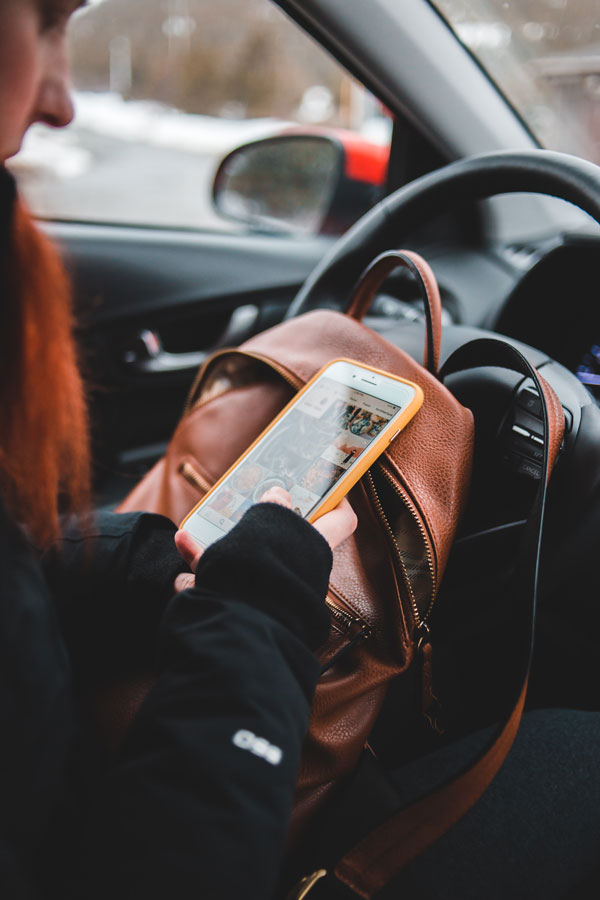Is Featured, Labor Law News
How the Courts Separate Personal from Business Use of Cell Phones
Consider a manager calling to reschedule a meeting, a delivery driver phoning for the next dispatch, or a salesperson texting their spouse while driving to an appointment. It’s easy to see how often distracted driving occurs while “acting in the scope of employment,” a key criterion that has been broadly construed in cases involving distracted drivers using their cell phones.
Can Employers Be Held Liable By Employees Who Crash Using Their Phone While Driving?
Even if the employee is off duty, the employer can still be held liable as the lines between an individual’s business and personal lives are blurred.
Considerations The Court Looks At
- Who owns or provides the cell phone
- Who owns or leases the vehicle
- Whether the employee was making a work-related call or text
- Why the employee was driving at the time
- What the purpose of the journey was
- Who was in the vehicle
A skilled plaintiff’s attorney will seek to pin liability on the employer, as it likely would have the deepest pockets in the crash. The victim’s attorney will seek extensive discovery of the underlying cause of the negligent acts, including the circumstances of the cell phone usage. Expect discovery of the driver’s cell phone records to pinpoint when and where the employee uses the phone; cell tower records showing where the call started and ended to show cell phone use while driving; texting record, which may include the content of the messages; and details of the employer’s cell phone policy and its implementation and enforcement. They might also seek punitive damages, where allowed.
The Employer’s Role in Combating Distracted Driving
To mitigate risk, employers must implement and enforce a clear cell phone usage policy. The National Safety Council recommends that employers adopt a total ban that includes handheld and hands-free devices and prohibits all employees from using a cell phone for work-related purposes while driving. The Occupational Safety and Health Administration (OSHA) advises employers that it is a violation of the OSH Act if an employer requires texting while driving, encourages or condones it, or makes it a practical necessity for the job. OSHA recommends that policies explicitly forbid texting while driving.
Some employers might find a total ban too restrictive and unrealistic. At a minimum, employers must be certain that any state law is incorporated into the policy. Most states have enacted legislation aimed at curbing distracted driving, especially distracted driving. According to the Governors Highway Safety Association, state law is reported as follows:
- All cell phone use: While no state bans all cell phone use for all drivers, 39 states and D.C. ban novice drivers from all cell phone use, and 20 states and D.C. prohibit it for school bus drivers.
- Handheld cell phone use: All drivers are prohibited from using handheld cell phones while driving in 21 states, D.C., Puerto Rico, Guam, and the U.S. Virgin Islands.
- Text messaging: All drivers are banned from text messaging in 48 states, D.C., Puerto Rico, Guam, and the U.S. Virgin Islands. As of February 2020, Montana does not have any restrictions on texting while driving, whereas Missouri prohibits novice drivers from texting while driving.
How Employers Can Combat Distracted Driving
With a more mobile workforce and technology aiding remote working, multitasking employees are more regularly conducting business away from the office—and all too often, they are conducting work 24/7 and on the road.
Distracted driving, including talking or texting while driving, is the leading cause of killer crashes on the roads, according to the National Safety Council. In 2017, 3,166 people were killed in crashes involving distracted drivers, based on research from the National Highway Traffic Safety Administration. And, according to a 2013 study by the AAA Foundation, more than a quarter of motorists reported sending a text or email while driving within the past month, with the most frequent texting and driving adults ages 25 to 39 (45%). Moreover, drivers are 23 times more likely to crash if they are reading or sending a text message. This should be most concerning for employers, who can be held liable for damages when a distracted driver is acting in the course and scope of their employment.
Regardless of state law, human resources managers should take action to reduce distracted driving:
- Minimize time behind the wheel. For certain employers, driving is a necessary part of the employee’s work. Nevertheless, not only should the employer make sure the trip is necessary, but it should also make sure that the vehicles are well-maintained and safe for the road.
- Provide training. Provide regular and ongoing training to reinforce corporate policies.
- Enforce compliance with corporate policy. HR managers cannot allow a distracted driving policy to be mere words on paper with a lax enforcement culture. It needs to be enforced with disciplinary actions to have teeth.
Employers should evaluate their corporate culture, assess which jobs require driving, and then take steps to minimize safety risks for their workforce and the greater public.
For more tips on employer obligations under federal and state labor laws, check out our Labor Law Updates.

